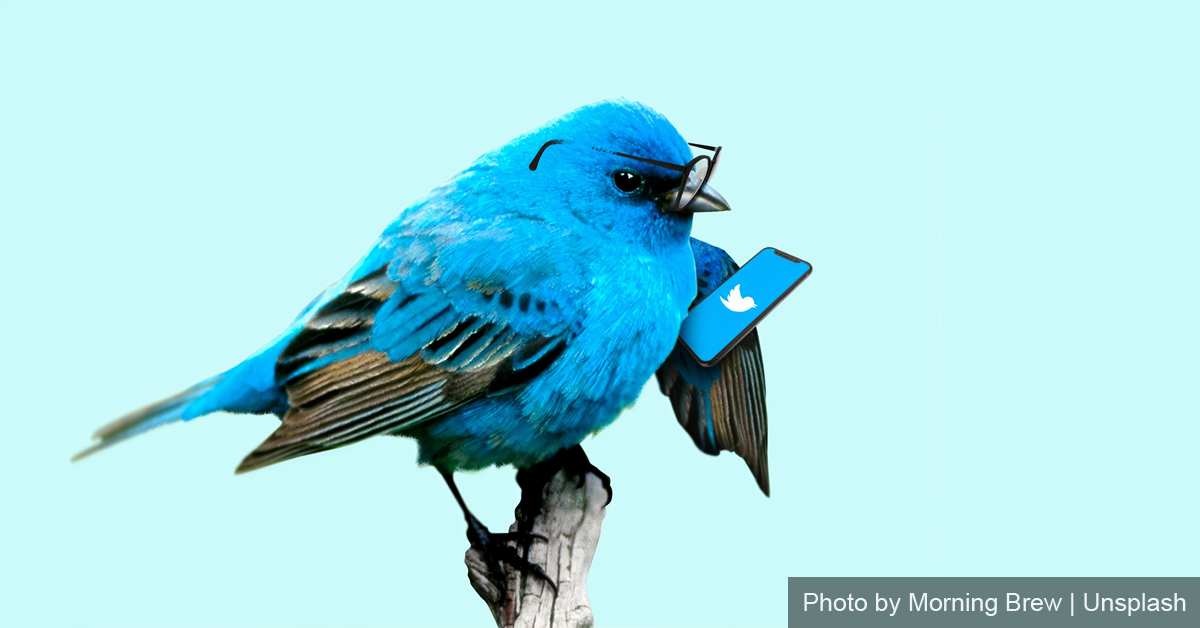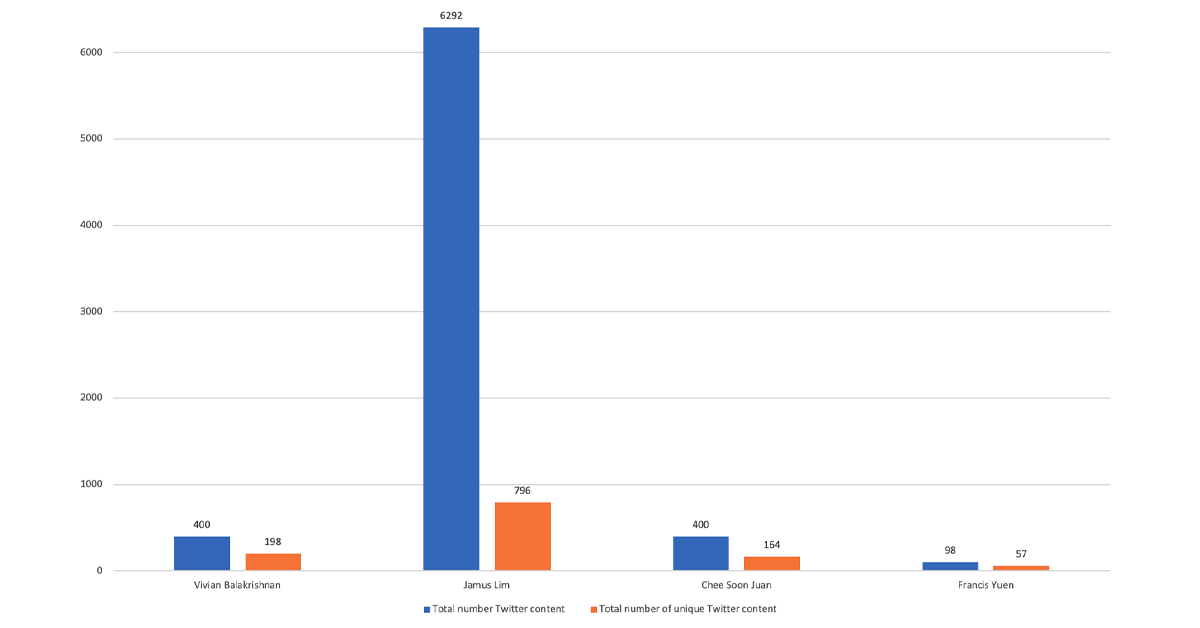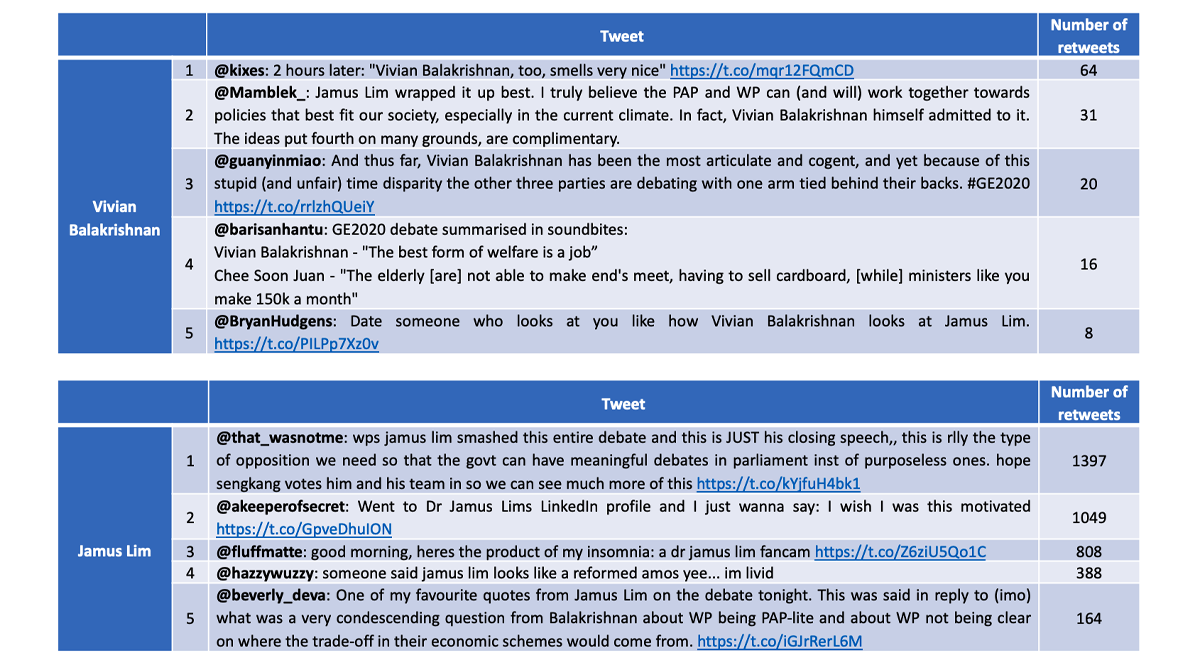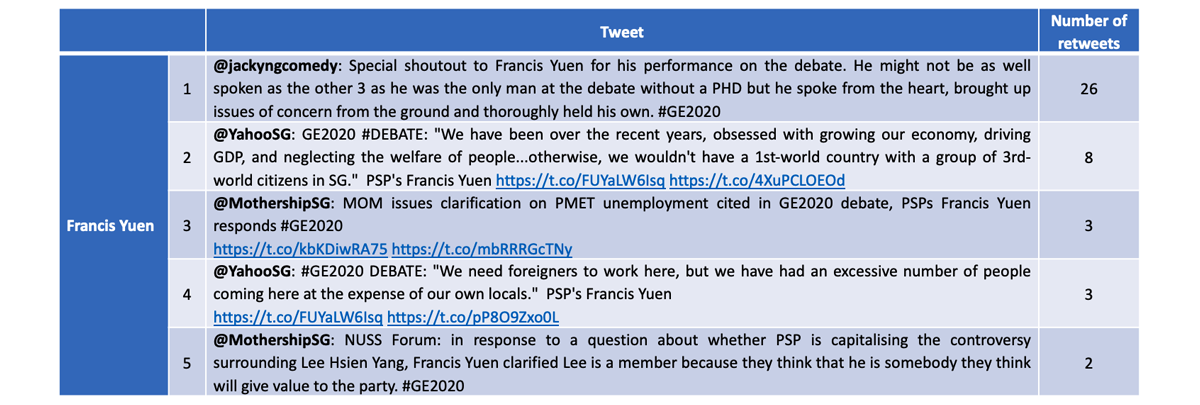
By now, I’m sure many of us have either watched or heard about the political sparring between the People’s Action Party (PAP), Workers’ Party (WP), Singapore Democratic Party (SDP), and Progress Singapore Party (PSP) on 1 July 2020, on Singapore Votes: The Political Debate. Politicians Vivian Balakrishnan (PAP), Jamus Lim (WP), Chee Soon Juan (SDP), and Francis Yuen (PSP), took part in the live debate, which has since received over 420,000 views on YouTube.
Much of the online attention after the debate has been on WP’s Jamus Lim, who received wide praise for his substance and eloquence during the sparring, as well as for warming the cockles of viewers’ hearts with his charming smile.
So, that got me curious. What was the online attention on the other three politicians like in comparison? What were people saying about them? How did the online engagements differ across the four politicians?
To satisfy my curiosity, I decided to take a look at what people were saying on Twitter about the debate. I chose Twitter because Twitter’s API is a lot more open and friendly for collecting data (than other social media platforms), and also because I am more comfortable with data mining on Twitter as I am very new to the field of data analytics.
I used Tweepy, a Python library for accessing the Twitter API, which has many features including capturing tweets and automating status updates etc. You can read more about it here if you are interested. I used the Search API that returns a collection of relevant tweets matching a specified query. In this case, I used four different queries — “Vivian Balakrishnan”, “Jamus Lim”, “Chee Soon Juan”, and “Francis Yuen”— and collected Twitter content that had been published from when the debate started, to 3 July 2020 (Friday) i.e., roughly within 48 hours since the debate.
But first, a caveat.
Twitter’s Search API does not capture an exhaustive source of tweets, as not all tweets will be indexed or made available via the search interface. For example, I believe it can only capture content from public Twitter accounts. Hence, for example, the number of times a tweet had been retweeted may be higher (if you check the actual Twitter profile) than what I have captured here, because the former takes into account retweets from private Twitter accounts, and is also cumulative in real time. So, what I present below is really more of a glimpse of what had transpired on Twitter.
With that out of the way, here’s what I found.
HOW MUCH TWITTER CONTENT WAS GENERATED?

Total number of tweets and retweets that had mentioned “Vivian Balakrishnan”, “Jamus Lim”, “Chee Soon Juan”, and “Francis Yuen” within 48 hours since the debate.
The blue bars in the graph above represent the total number “Twitter content”, by which I mean a combination of tweets and retweets, that had contained “Vivian Balakrishnan”, “Jamus Lim”, “Chee Soon Juan”, and “Francis Yuen” respectively.
As seen from the blue bars, WP’s Jamus Lim received the greatest online attention on Twitter, which is not entirely surprising based on the media reports and anecdotal evidence thus far.
What was surprising (to me) however, was just how much more Twitter engagement he received as compared to the other politicians. There were close to 6,300 tweets and retweets that had mentioned “Jamus Lim” within 48 hours of the debate, which was at least 15 times greater than the number of tweets and retweets that had mentioned the other politicians — there were 400 tweets and retweets that had mentioned “Vivian Balakrishnan” and “Chee Soon Juan”, and only 98 that had mentioned “Francis Yuen”.
The orange bars represent the number of unique Twitter content, which are likely to be original tweets. In other words, the ratio of “total number of Twitter content” to “total number of unique Twitter content”, gives us a rough idea of how much retweets had contributed to the overall online engagement with each politician.
For Twitter content that had contained “Vivian Balakrishnan” and “Chee Soon Juan”, about half were original tweets and half were retweets. There were slightly more original tweets (about 58 per cent) than retweets (about 42 per cent) that had contained “Francis Yuen”. For Twitter content that had contained “Jamus Lim” however, about 87 per cent were retweets, clearly suggesting the importance of retweets in driving the virality of and online attention on Jamus Lim on Twitter. We will look at what exactly caught people’s attention later on.
HOW MANY USERS TWEETED ABOUT THE DEBATERS?

Total number of unique accounts that had mentioned “Vivian Balakrishnan”, “Jamus Lim”, “Chee Soon Juan”, and “Francis Yuen” within 48 hours since the debate.
From the graph above, it is quite clear that there were significantly more unique Twitter accounts that had tweeted or retweeted about Jamus Lim, as compared to accounts that had tweeted or retweeted about the other politicians. In fact, the number of Twitter users that had tweeted or retweeted “Jamus Lim” was at least 13 times greater than that of the other politicians.
So, not only did WP’s Jamus Lim receive significantly more online attention and engagement in terms of the total number of tweets and retweets (as we saw earlier), he also reached significantly more people than the other politicians did in terms of the number of unique Twitter users that had tweeted and retweeted about him.
WHO GENERATED THE MOST TWITTER CONTENT?
I also wanted to find out which were the specific Twitter accounts that generated the greatest amount of Twitter content about the four politicians.
The table below shows the top 10 Twitter accounts that had tweeted or retweeted “Vivian Balakrishnan”, “Jamus Lim”, “Chee Soon Juan”, and “Francis Yuen” most frequently, and the numbers in the brackets indicate how many times that particular Twitter account had tweeted or retweeted the respective politicians over a span of 48 hours since the debate.

Top 10 Twitter accounts that had tweeted/retweeted “Vivian Balakrishnan”, “Jamus Lim”, “Chee Soon Juan”, and “Francis Yuen” most frequently.
In general, we can see a mix of Twitter accounts belonging to news media outlets and average Twitter users among the top 10 lists, with the exception of the top 10 list for Jamus Lim.
About four out of the top 10 accounts that had tweeted or retweeted “Vivian Balakrishnan” and “Chee Soon Juan” belonged to news media outlets such as @asiaonecom, @YahooSG, or @ChannelNewsAsia. Two out of the top 10 accounts that had tweeted or retweeted “Francis Yuen” belonged to news media outlets. However, none in the top 10 accounts that had tweeted or retweeted “Jamus Lim” belonged to news media outlets.
But does this mean that the news media did not give Jamus Lim as much media attention as compared to the rest? Not at all. I checked beyond the list of top 10 accounts that had tweeted or retweeted “Jamus Lim”, and found that @YahooSG had tweeted about Jamus Lim 8 times, @asiaonecom and @MothershipSG did so four times, and @MustShareNews did so three times. So, it is not that the media gave Jamus Lim less attention, but rather that the average Twitter users were way more active in tweeting and retweeting about Jamus Lim than the news media outlets.
I think this also suggests something about the nature of the online attention that Jamus Lim received — not only did he receive significantly greater attention in terms of the number of tweets and retweets, and the number of unique Twitter accounts reached, he also seemed to have enjoyed more organically-driven online attention from average Twitter users, rather than from media outlets or news aggregator accounts dedicated to election-related news.
WHAT CAUGHT PEOPLE’S ATTENTION?
Finally, as promised, let’s take a look at the specific tweets that caught people’s attention within 48 hours since the debate. The tables below show the top five tweets that had mentioned each of the four politicians, which received the most number of retweets subsequently.



Top five most frequently retweeted content that had mentioned “Vivian Balakrishnan”, “Jamus Lim”, “Chee Soon Juan”, and “Francis Yuen” within 48 hours since the debate.
The best performing tweet (in terms of most number of retweets received) that had mentioned “Vivian Balakrishnan” came from @kixes, who linked a commentary written by veteran journalist, P N Balji, about his assessment of the debate. @kixes’ tweet, “2 hours later: Vivian Balakrishnan, too, smells very nice”, seems to be throwing shade at AsiaOne’s headline change of its coverage of the political debate, where the original headline “WP’s Jamus Lin wins over the internet after his performance in GE2020 live debate” had been amended to “WP’s Jamus Lim and PAP’s Vivian Balakrishnan win over the internet after their GE2020 debate performances”. You can read more about the incident here.
The best performing tweet that had mentioned “Jamus Lim” came from @that_wasnotme who tweeted about how Jamus Lim had “smashed” the debate, and appealed to Sengkang GRC voters to vote him into Parliament so that there would be more of such debates in the future. @that_wasnotme’s tweet was retweeted 1,397 times based on the data I managed to collect. The other tweets among the top five also had largely positive sentiments about Jamus Lim — in fact, someone even made a fancam! Though I’m not quite sure what to make of Jamus Lim looking like a reformed Amos Yee.
Ministerial salaries in Singapore seems to be an evergreen topic as seen from the best performing tweet that had mentioned “Chee Soon Juan”, from @saralje. Finally, the best performing tweet that had mentioned “Francis Yuen” came from @jackyngcomedy, who commended his performance during the debate for being genuine, sincere, and grounded.
CONCLUSION
In short, it looks like WP’s Jamus Lim outperformed the other politicians on Twitter, by gathering the most number of tweets and retweets, reaching significantly more Twitter users, and enjoying more organically-driven online attention. Tweets mentioning him that caught the most attention among Twitter users also had largely positive sentiments about his debate performance. That said, we will have to wait till 10 July 2020 to see if winning the Internet means winning the votes as well.
I would like to acknowledge Elton Quek’s help with the early versions of the code, and Nadzirah Samsudin for her feedback on the article.
Shawn Goh is Research Assistant in the Society and Culture Department at the Institute of Policy Studies. His research focuses on understanding the social impact of digital media technology, specifically in the areas of misinformation and disinformation, Internet governance, and digital inclusion.
This piece was written in his personal capacity and was first published on Medium on 4 July, 2020.
Top photo from Unsplash.
